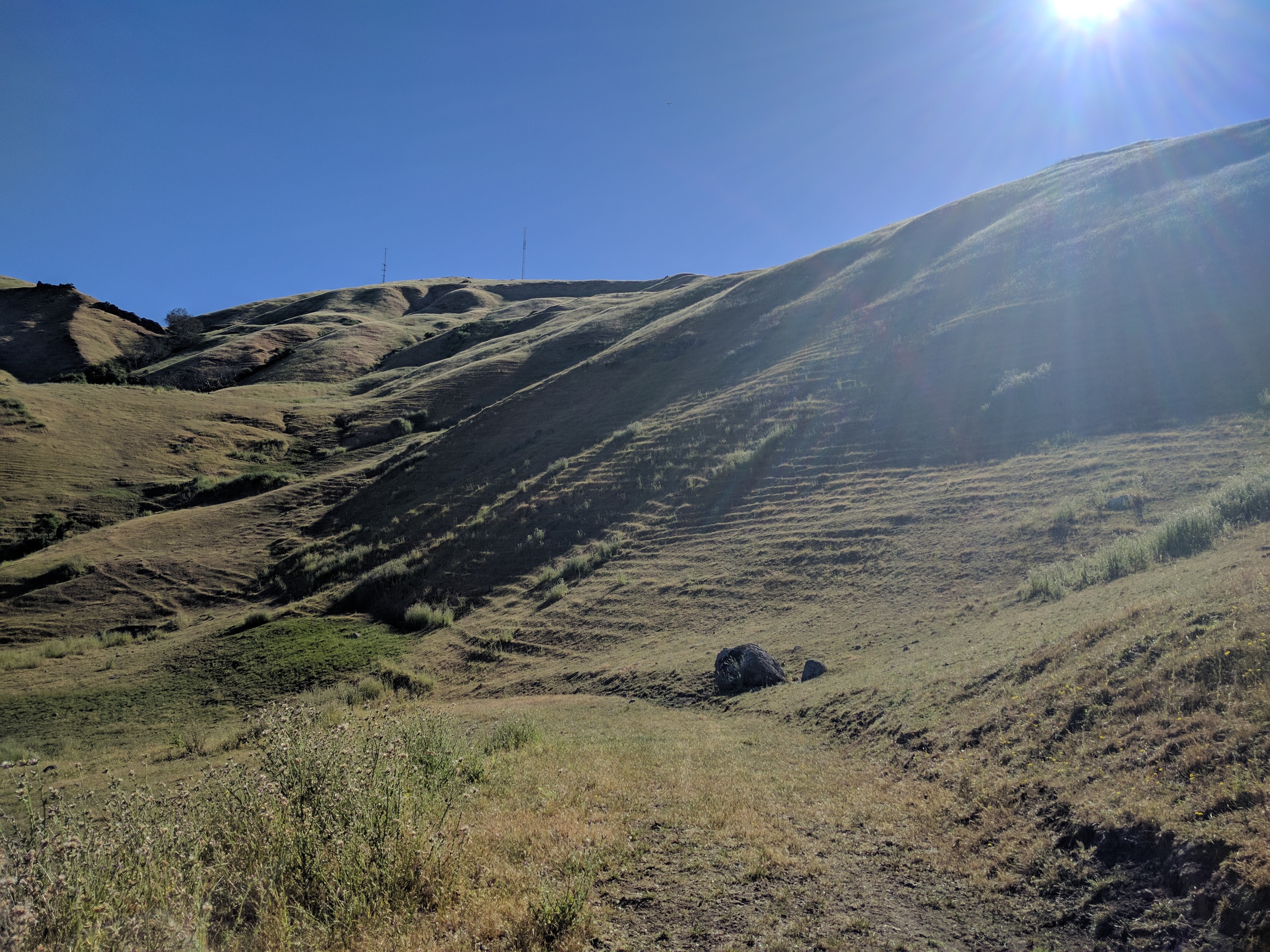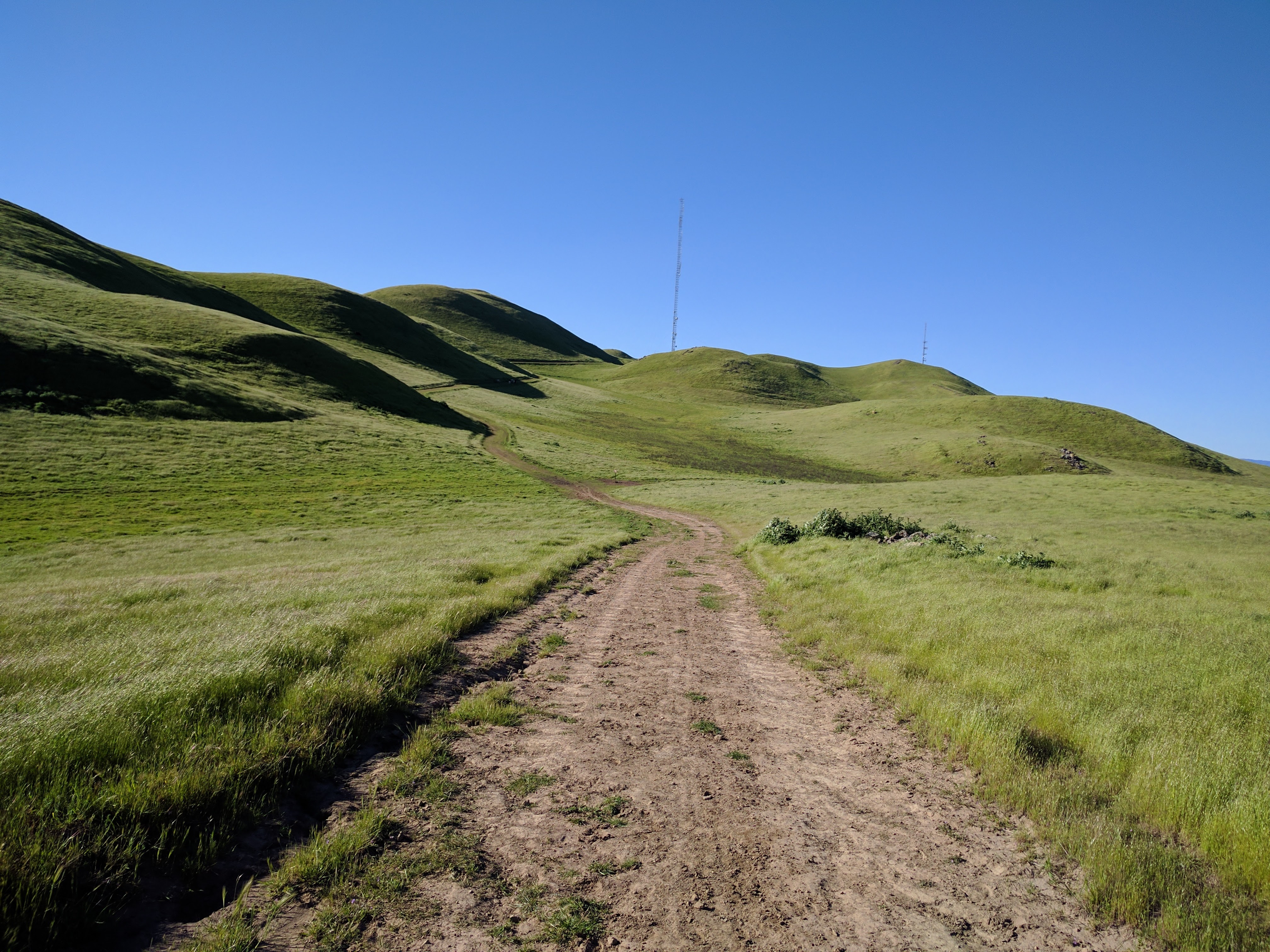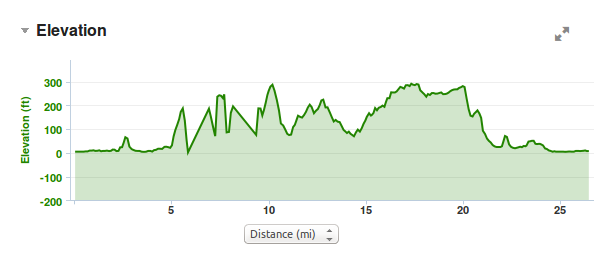One of the many things running gives me each day is an opportunity to think: to reflect on whatever’s going on in life, to anticipate what’s to come, to process that which has already happened (or is happening), and to simply try to make sense of it all and figure out my place, role, or situation therein. It simultaneously winds me up and allows me to unwind. Running, and in particular, marathon training, has given me endless opportunities to get inside my head and attempt to solve whatever maladies have cropped up in life. Have a problem? Go for a run. It’ll solve it. Miles will do the trick.
…except sometimes, it doesn’t. Sometimes, for as great as running is — and I do sincerely think it’s pretty rad, obviously — running can’t solve every problem out there. It’s an unrealistic expectation to have, and I’d be asking too much of a physical activity, of a series of repetitive movements, to help elucidate some of my most important questions. The cathartic and meditative aspects of running can definitely help me see things more clearly, but unfortunately, even this great sport of mine can’t help me solve or understand everything, try — and try — as I might.
It has been one year, exactly, since my 30 year-old cousin, and mother of an 18 month-old daughter at the time, overdosed on heroin in northeast Ohio and died. One year. July 17, 2016. Last summer, my girls and I were visiting my family at the time, and I saw my cousin literally the day before she overdosed: probably about 12 hours before, even. My kids and I were staying at my parents’ house, and I was in bed for most of the afternoon feeling awful with a likely not-yet-diagnosed-colitis flare. My cousin was at my parents’ house, helping to clean their place for them, for which my parents were extremely grateful. When I eventually got out of bed, my cousin and I — and later, my aunt (her mom) and my parents and my kids — were all hanging out on my parents’ back porch, bullshitting, talking about our daughters and what mischief they were making, just typical parent banter. There was nothing special or life-altering to this conversation. My cousin said that she, too, was feeling like shit and that she was going to go home that night, take some Tylenol, and hopefully get to bed early. I thought nothing was remarkable about the conversation — it was a conversation I could have had with just about anyone, anywhere — and I definitely didn’t infer from anything my cousin said that she was using (again) or that she had something nefarious up her sleeve for later. We were simply humans — relatives who hadn’t seen each other in at least a year-plus, since whenever the last time was that our paths crossed when I was visiting Ohio — catching up and hanging out for a quick minute in mid-July. The mundanity of the evening, of the conversation, was universal.
That was the last time I heard her voice and saw her alive.
The following day, after running in the morning, I was at a grocery store, standing in the dairy section picking something up for my parents, and my dad called me and simply said she’s gone. Hearing his words — words that my family and I knew could always be a possibility to hear, given what we understood to be my cousin’s ongoing battle with addiction — knocked the wind out of me. Knowing that there’s always a possibility of something coming down the pike is profoundly different than actually having it come to fruition, of hearing the unspeakable actually be spoken, no matter how much you know in your heart of hearts that it’s a possibility. We all know we will all someday die, but we still have that sense of incredulity when we learn that someone we know personally — someone we love, maybe someone to whom we are related — is gone. My knees instantly felt like they buckled, and before I knew it, I was crouching on the floor of a stupid grocery store, on the phone with my husband (who had just flown home two days before), calling and telling him the news in disbelief. Not long later, I had to figure out how to explain to my eldest — just over 5 at the time — how mommy’s cousin died (and what that means to die, to cease being alive) because of something bad called drugs, something that she put in her body on her own volition that hurt it so much that mommy’s cousin’s body just wasn’t strong enough to deal with it and so it stopped working forever. Wrapping my 32 year-old mind around my 30 year-old cousin dying from an overdose was challenging enough, but how the hell could I help my five year-old conceptualize this in a way that’d make any sense to her? Where do you even start?
And thus began the past year of processing, wondering, endlessly questioning and searching for answers — any answers — that could help me understand — that could help me understand literally anything related to addiction and using. Fuck looking for a needle in a haystack; trying to understand this stuff is like searching for a distinct grain of sand in the Sahara. Where and how do you even start?
If you follow national news even just in passing, you’ve probably seen that Ohio is in the throes of a horrendous opioid scourge. Basically anytime I see Ohio in the news from California — anytime Ohio makes its way to national news — it’s almost always opioid-related. I could throw statistics out here to help quantify the dilemma, but they’ll become outdated quickly, and numbers don’t illuminate the very real and more important human element of the problem. Here’s a quick one, though, and it’s fairly memorable: recent numbers suggest that on average, Akron is seeing about 9-10 people daily for overdoses. Akron’s not that big of a city, so that’s a fairly staggering number. Heroin is so cheap and ubiquitous now that when you take its accessibility and relative affordability and compound it with a population of people who are taking prescription painkillers (and whose prescriptions eventually run out but who have since become addicted and/or still need pain relief), it turns disastrous. That’s, of course, just in addition to people who would have used/abused in the first place, without transitioning to it from prescription painkillers. Clearly, it’s a pretty shitty scenario. Akron’s BOE is even trying to get Narcan into middle schools and high schools so that in the event of a middle schooler or high schooler overdosing on school property (which hasn’t yet happened — yet being the operative word), or coming to school after overdosing/coming into contact with the drugs at home, administrators can deliver the agents and possibly save students’ lives. And for as horrible as all of this is, this doesn’t even touch on the tragedies that have surfaced this year that involve children — toddlers, FFS! — who somehow get ahold of drugs, ingest them (as toddlers are wont to do, putting foreign objects in their mouths all the time to explore their world), and die. Holy shit. It’s that bad. It may sound like fear-mongering, but the horrific statistics show that this epidemic is literally killing individuals, young and old alike, all over Ohio.
My cousin died just days after her 30th birthday and very shortly after the July 4th weekend, when carfentanil-laced heroin hit the streets of Akron. If you don’t know what carfentanil is, welcome to the club; very few people, including police, did before the 7/4 weekend last year. It’s a large animal sedative — think elephants, zebras, that sort of thing — and when vets administer it, they wear full-on hazmat suits because even the smallest traces can be deadly to humans. Fentanyl-laced heroin was already present there — fentanyl being the drug that toxicologists think Prince overdosed on, a synthetic (human-made) opioid that’s 50x more potent than heroin and 100x more potent than morphine, according to the CDC — so buying heroin apparently has become (much more of) a gamble in the past year. When you buy, you don’t really know what’s in what you’re getting; I guess that’s part of the risk and reward. You may get a much stronger and higher high — the purpose of lacing the drug with fentanyl or carfentanil — but your coveted high also might kill you swiftly and effortlessly, annihilating you before the needle’s out of your arm and your body’s on the floor. I don’t know what was in the heroin that killed my cousin, nor do I think speculating about it is all that helpful, but I can’t help but wonder since she died shortly after carfentanil made its debut in Akron. I’ll never know, and honestly, it doesn’t matter. She’s still gone. No (further) explanation can change that. It just sucks.
Suffice it to say that addiction is a beast. I have tried so hard to understand it in the past year, following my cousin’s death, and it has taken me nearly a year to realize that no matter how many articles I study that talk about what’s ravaging NE OH right now, or how many books about addiction I read from experts or clinicians or whoever, or how many websites I frustratingly stumble upon that needlessly politicize and moralize addiction — basically maintaining that addiction is indicative more of a “moral failing” and that it, as a medical condition, simply doesn’t exist; that it boils down to a simple choice to use or not to use, “because no one forces you to put a needle in your arm” — no matter how much I read, and how many questions I ask, and how much I hash and rehash my cousin’s situation with my family, I will never be able to arrive at a) any answers that will completely satisfy me or b) any answers at all. I want to rationalize and understand this, just as I do for basically everything else in my life, but I can’t. I’m simply incapable.
As a family member who has been trying to make sense of a death of a loved one, that’s frustrating as hell.
To be sure, probably the only unanimous thing I’ve read about addiction is that “getting it” on even the most rudimentary level will simply be beyond my understanding because I’m not an addict. Addiction is something that only addicts can understand … and understandably, for a grieving family member, for someone who wonders nearly every single day if I could have done something differently, if my family and I could have helped in some way, if we could have loved her or supported her more or less or differently, that feeling of relegated powerlessness is pretty shitty.
I’ve spent many of my runs in the past year trying to make sense of my cousin’s death. At times, I have been so, so very mad at her — raging mid-run and wondering how could you do this? How could you do this to your 18 month-old daughter?! How could you do this to your parents, who have done so much for you?! — and other times, I have felt nothing but sympathy, thinking that she was simply incapable of seeing the larger picture, of seeing beyond herself and her own self-interests, and that her addiction was what eroded her senses and brought her down to a universe where she — and only she — existed. Anger, sympathy, acceptance: I guess that’s the stages of grief, right?
Thinking about my cousin’s death in such emotional terms has done me no favors in accepting that she’s gone, but this article my sister shared with me in the past few months helped my non-addict mind understand the biology behind addiction just a little bit better. I still have so many questions, and I know I’ll never get the answers (or that even if I do, they won’t sufficiently lessen the blow of her death), but in the past year, I’ve come to terms with my cousin being more at peace now — in death — than she ever was in life, particularly in the recent past before she died. She used, she was clean for a while, she used again, she stopped — whatever her cycle was, I’ll never know what (or who, or why, or how she felt that) compelled her to start using again, and even if I did know, the answer would get me nowhere. I think it’s natural to want to point fingers and assign blame, but again: doing so won’t change a thing. Having answers to all my questions won’t bring her back, it won’t return her to her daughter, nor will it return her to my aunt and uncle.
I don’t blame my cousin for her own death, for being an addict, any more than I’d blame any other relative of mine for getting cancer, stroke, heart disease, diabetes, or whatever; in the crudest terms possible, my cousin had an imbalance, a neurological misfiring that led her to a downward, self-destructive spiral that she was incapable of successfully navigating. That my cousin suffered from addiction doesn’t make her any less of a good person, a doting mother, or a hard-working and loving daughter; it simply speaks to the gravity of the absolute beast, bitch, hell, and fuckupedness that the disease of addiction is and the totality of destruction it can wreak on your life. It can literally happen to anyone, and I can’t help but wonder if there’s some genetic predisposition that we, societally, have yet to fully understand about this leviathanic, no-holds-barred disease. I don’t know. I doubt people who use do so thinking that they will become an addict one day and destroy their lives; hell, the very last thing my cousin posted on facebook was a link to an ABJ article that highlighted how many people had overdosed in Akron in the preceding days, and she editorialized how outrageous and saddening she thought it was. She, herself, was gone 2, maybe 3 days later, to the same thing she had lamented. What shitty irony, Alanis. Maybe my cousin — like many of us — thought she was invincible, incapable of succumbing to something over which she was positively certain she had control. Unfortunately, heartbreakingly, she was wrong.
As I’ve searched for clarity in the past year, it destroys me to know that her daughter will grow up only with the memories of her mother that her family members share with her. When G turned 18 months, I immediately felt joy — another milestone! getting so big and independent!– but also a sense that I can only liken to dread or despair, knowing that that was my cousin’s daughter’s age when my cousin died. It made the salt on the gaping wound burn more intensely.
Nearly a year later now, I still periodically look at my cousin’s fb page — thinking that maybe what I know happened didn’t actually happen — and the endless RIP messages, the wish you were here, thinking of you, needing to hear your voice one more time messages rip me to shreds every single time. I read and re-read my cousin’s obit and am saddened, of course, but also can’t help but feel a sense of pride that my aunt and uncle explicitly talked about their daughter’s addiction and her succumbing to it. I can’t commend or applaud their bravery and courageousness enough. They could have said nothing, but they chose to talk.
I think it is really easy — tempting, even — for us to think that people who are most affected by the opioid epidemic are some shadowy figures in the underbelly of society, sketchy moral degenerates who lurk in back alleyways in major cities, but the truth of the matter is much more nuanced. It always is. People from all walks of life, from all professions, with tons of wealth or no money to their name — and their families, who are thusly implicated — now make up the tapestry of people whose lives have been undone, if not altogether ended, by this godforsaken epidemic. Lawmakers now have a huge opportunity to do something productive to combat this epidemic, but before that happens, it behooves us to talk about addiction in frank, clinical, and medical terms — as a disease, not a moral failing, not a “choice,” — much as we would if we talked about someone with heart disease, diabetes, or anything else. Addiction (and basically anything related to mental health) already has enough of a stigma; there’s seriously no need to add more to it.
You may think that you don’t know anyone whose life has been touched by addiction in some way, but by staying with me this long, reading my diatribe, now you can say that you do. My family isn’t the only one out there.
While I am not so delusional to think that my running will bring my cousin back to life or do anything to rectify or “cure” her (or anyone) of addiction, I am at least thankful that running has given me many, many opportunities over the past year to come to terms — maybe not peace, but I’m working on that — with my cousin’s abbreviated life. I look at my girls and my nephews and hope that they will never know a life ravaged by addiction. When I run trails, particularly through the expanse that connects Monument Peak over to Mission Peak and Mt. Allison, it’s often in that space — the area where I’m surrounded by nothing but hillsides, completely exposed, and rarely with any other sentient beings present, save for the occasional cow — where I think of my cousin the most and wonder what could have been for her and her life.

In this expanse of nothing, when it’s basically my thoughts and my environment, I inhale deeply and think that for as heartbroken as my family and I are, maybe my cousin’s death will be a wake-up call to someone — maybe the people who also used with whom she ran around, maybe whoever it was who got her to use again after being clean, maybe the person who sold her the batch that killed her — that momentary, opioid-induced highs are fleeting and that no one is invincible. It’s my sincerest hope that in thinking rationally about addiction — in talking about it, in problematizing and deconstructing the very real and complex and multi-faceted components that comprise such a profoundly life-altering and life-destroying disease — that somehow, someone, somewhere will effect some positive social change about it. It is so terribly awful that my cousin is gone, but maybe her death will help save someone’s life.

It has taken me nearly a year to figure out how to write about my cousin’s death here — on a running blog — and I know that I’m still not adequately capturing my cousin’s life, her essence, or her love for her daughter or parents. Though I will never be able to fully understand the magnitude of my cousin’s addiction or its destroying of her, as a family member, I can and do continue to mourn her and love her. If there was something I could have done, anything I could have said, to have helped her in some way, I would have. All of us would have. The only solace I can find is that in her death, she is no longer suffering… and that’s enough.
Nicole, we miss you and love you. Rest in peace.



